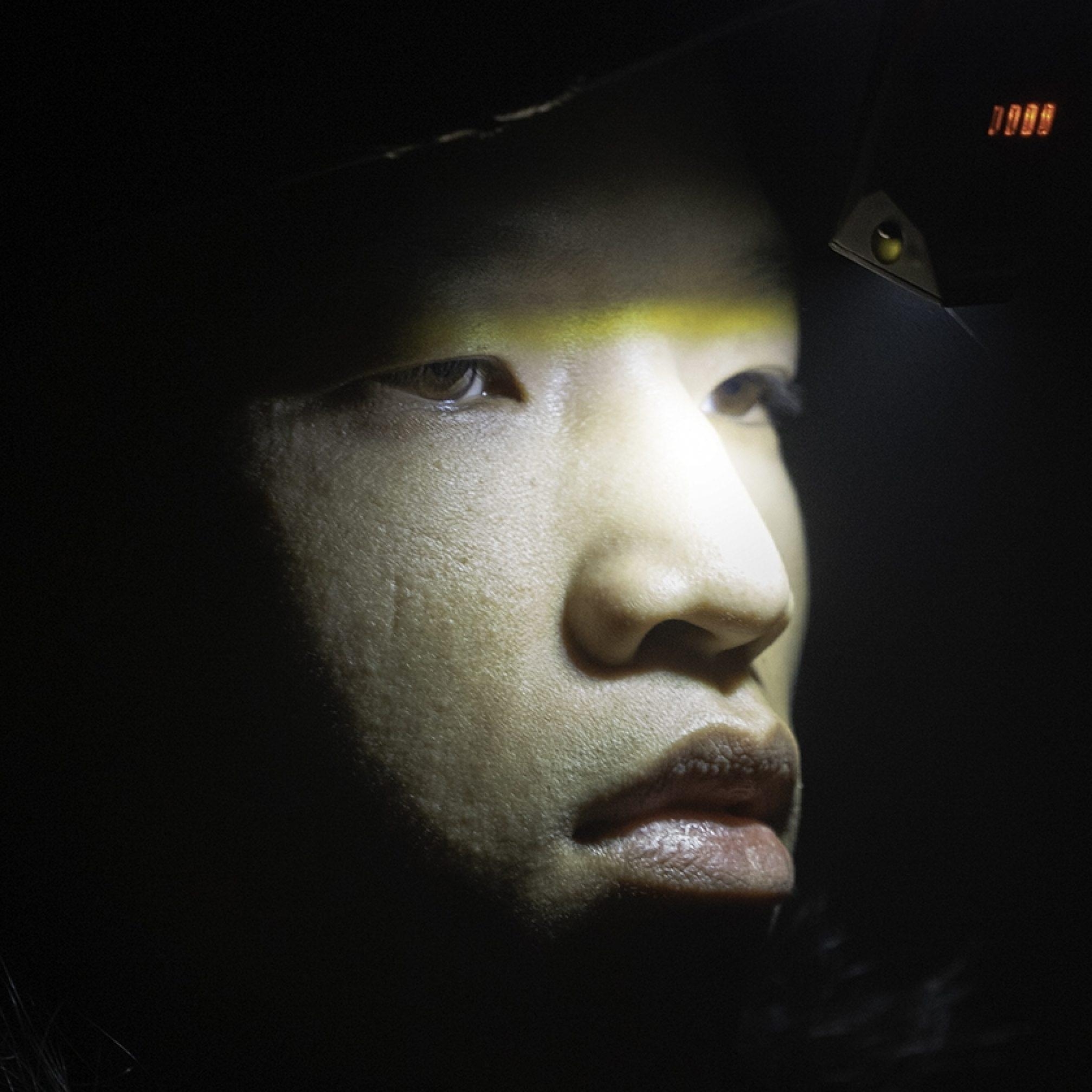 Features
Features
As LAVURN, Cassius Select explores his experimental, introspective side
Lavurn Lee is best known for crafting bone-rattling rhythms as Cassius Select. Now with a new self-titled project, he's incorporating a lifetime of music influence to reach what feels like his final form
The caption of a surreal, scatty music video created by LA-based visual artist 011668 reads: “I have just received an anonymous zip titled LAVURN from User-cassius_1 (not sure if LAVURN is an acronym or the name of the intended recipient). The contents of the file include a series of codes, coordinates and diagrams detailing the inner architecture of all European Institutions currently in possession of contested artefacts. Run application ‘LAVURN’ to be integrated into the web browser. Use highly elastic astral gaussian splatting to locate and return the stolen artefacts.”
Onscreen, ‘00s-style rendered graphics of CDs, Need for Speed reminiscent cars and a Nokia brick phone rapidly appear and disappear, while soundtracked by haunting vocals and an experimental, spaced-out, electronic R&B beat. ‘MEZZANINE’ is the lead single from LAVURN’s (real name Lavurn Lee) self-titled debut album, released on February 16 via T.Morimoto and DJ Plead’s record label SUMAC. It nods to the early, Wild West days of the internet, when specialist blogs and niche forums ruled the musical roost.
It was during that era, roughly a decade ago, when a young LAVURN first started making beats hunched over a computer in his Toronto home. “I was active on blogs when I was 17 or 18,” Lee recalls from his Berlin apartment, where he is currently living. “I started sending stuff out to different people and was finding out about a lot of cool music through there and making bedroom pop kind of stuff – folktronica as it was called back then, or general electronica.
“I was really influenced by Atlas Sound [the solo project of Bradford Cox, lead singer and guitarist of indie rock band Deerhunter], because for a while he was just posting music all the time and writing about his life,” Lee continues. “I found that to be really inspirational, like that was the way I thought you should release music – put a MediaFire link up and talk about your personal shit.”

While the new album comes under a fresh alias, Lee is no baby in the music industry. A few years after he began producing, he moved to Sydney, Australia, where he discovered dancefloors and the music that fuels them. “During that time Sydney was almost trying to be like what LA was when they were doing the beat scene stuff – like FlyLo and Brainfeeder – and there were lots of club shows happening,” he explains. “A lot of friends of mine were making club music as the time, I hadn’t grown up with any dance music really, and had no idea what dance music was or any of the history and culture behind it, and I was just like ‘I’ll make techno’ because everyone else was making it.”
He began producing under his Cassius Select alias, drawing particularly on music rooted in UK bass music, but with a distinctive, leftfield edge of his own after finding inspiration in Hessle Audio, grime artists like Wiley, and early ’00s hip hop. His 2018 track on London label Hypercolour, ‘They Shook’, is a window into his creative brain – taking a UK funky groove and stripping it to its bare bones, before crunching it through a techno grinder and adding a huge, gunfinger-raising bassline. Other standout releases come on the likes of Banoffee Pies, Accidental Jnr and Unknown to the Unknown.
Read this next: Artists exciting us in 2024 / February
The new alias and album depart from that background, taking the music out from the dancefloor and into the home. Gone are thudding, repetitive kick drums, replaced by precisely engineered percussion, glitching sonics, and introspective singing. That idea to switch to vocal-led tracks – in essence a return to those bedroom pop roots – came in 2020, as the pandemic forced lockdowns across the world.
“Like a lot of people I started listening to older stuff, things I used to listen to. Full nostalgia trip – a lot of hip hop, alternative rock from the early 2000s, some nu metal like Deftones stuff, and then definitely trip hop. Like early Portishead – really moody, swaggy but still super emotional.”
It was a particularly reflective time, when on top of the isolation of lockdown, Lee was also going through a breakup. It naturally gave him the push to find his own expression of that energy and rawness found in the music he was listening to. ‘Combat Language’, the seventh track on ‘LAVURN’ sees Lee sample Camelia’s ethereal track ‘everytime’, while singing in deep baritone: “I watch your lips move, but I can’t hear/Baby, I can’t hear/No, I’m not there.”
“Naturally post-breakup time, and COVID, I was allowed to really go into my feelings – the lyrics are just raw and very much like when you’ve just broken up, still unsure about your feelings and you want to get back together,” Lee says. “So I was naturally writing a lot of this stuff, which is weird because it was the first time I used music as a way to express some real things in my life. That happens less so in dance music because it’s less vocal, [and it’s for] other people to have fun.”

Despite the switch in genres and intention, Cassius Select’s fingerprints are found throughout ‘LAVURN’’s 14 tracks. Like his best floor-filling bangers, the sound design is intricate and weird, while tiny flickers of breakbeats come and go. There’s also an appreciation for emptiness and space, which creates an eerie, sometimes nostalgic mood to the tracks.
“A lot of the music that I like has this sense of space and depth, either in the sound or the way it’s produced. Especially for this type of music that’s personal, it feels more intimate when there’s space. And as much as I'd like to separate the two sounds [Cassius Select and LAVURN], it’s all coming from me and I’m not what I’m not.”
Read this next: Artist Spotlight: Polygonia's celestial approach to building "cloud castles with sound"
The tracks come and go swiftly throughout the album, with some songs, like the half-time, hyper-processed ‘Steppin (Flipmode)’ and the aforementioned ‘Combat Language’ clocking in a hair over two minutes. That’s by design though, Lee explains, if not for the algorithm manipulation issues currently affecting the music industry: “On the one hand, it’s me being lazy as a songwriter and not finishing songs. I love writing the first verse and the hook idea or chorus then anything after that I’m like ‘I don’t really care’, like this song does two things really well and that’s it. On the other I was listening to a lot of rap that was quite short – but some of that has to do with wanting to get more streams.”

Such ability to let a track be reflects a confidence in his creative process and a willingness not to force a track to be something it’s not. And it comes as part of the maturity of a musician who has been releasing underground records for over a decade. While Lee has made music on monikers other than Cassius Select (including Fake in 2018), with LAVURN – Lee’s real name – it feels like he’s reached final form. Right now, he’s working on more music, which is taking him out of the bedroom, and expanding his range and the processes with which he records music.
“Recently I’ve been working with a vocalist from Oakland, we’ve been making rap music and contemporary club music and that process is so fun, because we’re both doing 50 per cent of the work, but we’re getting 100 per cent of the results,” he explains. “Whereas making all this solo music, you can have the project file and listen to [the same] loop for months and ruminate and be idle.
“[For] Jared and Tom [DJ Plead and T.Morimoto], they’ve been long friends of mine and it’s like pulling teeth trying to get me to finish stuff – without them this record wouldn’t have come out,” he continues. “The album’s a culmination of a lot of support from people – I don’t want to frame it as a breakup album because that’s a one-sided view of things. So, the thing I enjoy the most about the record and has the most meaning to me is that it’s being done with the support of friends.”
‘LAVURN’ is set out now via SUMAC, get it here
Isaac Muk is a freelance writer, follow him on Twitter


